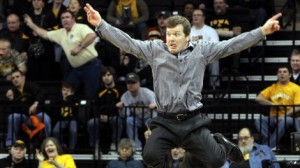This is yet another wrestling blog that I will attempt to relate to leadership development. Please take a second to watch the video posted above (hyperlink under the picture of Tom Brands, the Iowa Hawkeye Head Wrestling Coach.) If you’re still somewhat engaged after that, please continue reading.
My blogs are usually long and drawn out, so, I will try to keep this one “shorter”. In college wrestling, there are 10 weight classes. Most matches are won by a point or two and for a decision win ( a win by less that 8 points) your team earns 3 team points. I won’t go further into scoring, but hopefully you can see that matches are close and the outcome is determined by 10 head to head matches. Last night, Friday, January 4 2013, the Iowa Hawkeyes won 7 out of 10 matches and won their dual against a tough Ohio State wrestling team by a score of 22-9. You can do the math.
So what am I driving at here? In the video interview, you see a fired up coach after a dominate performance by his team. They won, he should be satisfied and hopeful about the future, right? Wrong. Even minutes after defeating one of the tougher teams in the Nation, coach Brands goes on to talk about everything they could have done better. He mentions missed opportunities by his student-athletes, but most importantly, Brands says that he is responsible for what he considers a poor performance.
How easy is it for all of us to gloat and relax after we complete a successful task? We meet our goals and we think, “Mission accomplished.” On the flip-side of that, how easy is it for us to search for excuses when we fall a bit short of our intended outcomes? Pretty easy. It’s human nature for the most part.
What I want to drive home here are a couple things. Intensity about what you do for a living is important. Too much intensity can be unhealthy, but if you are not intense about what you do, this implies a lack of dedication to being the best you that you can be.
Performance standards. We all have performance standards, but when we don’t meet them, how likely are we to be critical of ourselves like Brands is in the video above? He could have easily said, “I’m an Olympic medalist, decorated NCAA wrestler and I have taught these wrestlers everything I know. They just didn’t put it into action.” When you think about it, after the last day of practice, a wrestling match’s outcome is completely out of control of the coach. It’s not like in football where bad play calling can determine the outcome of a game. Brands is a leader and a good one at that. Leadership is not about beng always being right. It is about putting people in places where they can be successful and overseeing the process. It’s about intervening to offer assistance when needed, but what is most important is the willingness to accept when you may have failed to do all of the things you needed to do to give your team an opportunity to succeed.
If you take the wrestling aspect out of the equation and just look at the thoughts, ideas and standards that Brands mentions, I think we all can learn a lot about the characteristics of effective leaders. Sometimes, accepting responsibility for a poor performance is the best thing a leader can do because it shows your colleagues that you have just as much skin in the game as they do.
Be passionate about what you do. If you’re in the credit union industry and you’re reading this, you have a lot to be passionate about. Passion leads to a healthy level of intensity and intensity breeds a level of self responsibility. All of these things are related to each other.
What are some other characteristics of effective leadership that you can think of?
Without wax,
Bryce
